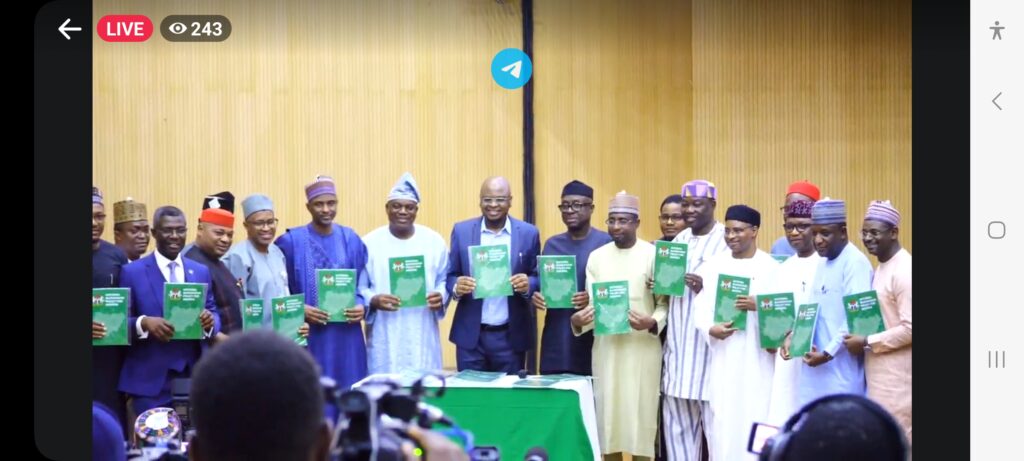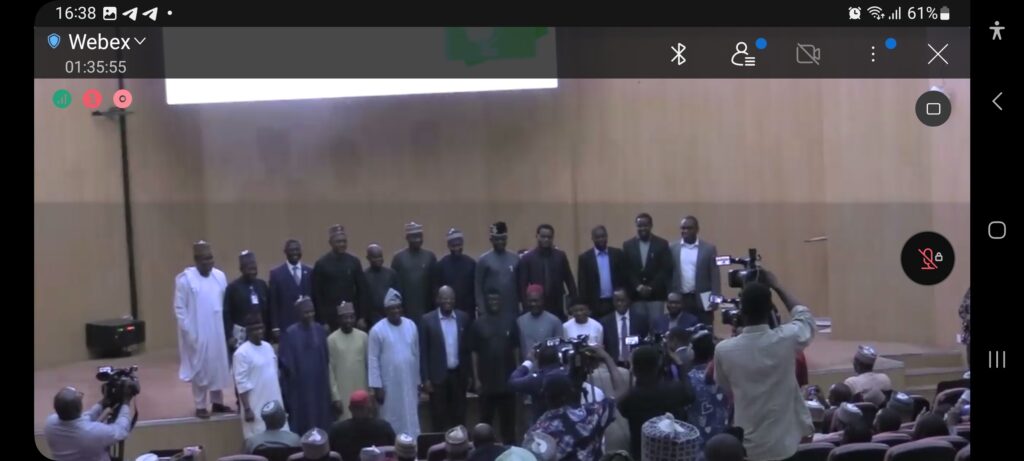Launch of the National Blockchain Policy for Nigeria

The National Blockchain Policy for Nigeria which was approved on the 3rd of May, 2023 was officially launched on the 16th of the same month, by the Honourable Minister of Communications and Digital Economy, Prof Isa Ali Pantami where he mentioned that by this policy,
“Blockchain Technology and all its components and types are no longer illegal, they are legal in Nigeria”.
“The Federal Government of Nigeria has approved Blockchain Adoption, Blockchain Innovation and many more in the country”.
The event was a three-fold event which saw to the following:
- The launch of the National Blockchain Policy for Nigeria.
- The Inauguration of the Policy Implementation and Steering Committee and
- The Graduation of the 32,022 youths who were the first set of the beneficiaries of the National Blockchain Policy Implementation.
In a welcome address and brief on the National Blockchain Policy for Nigeria by the Director General of National Information Technology Development Agency (NITDA), Mallam Kashifu Inuah Abdullahi, He stated that the event marked a remarkable milestone of Nigeria into a digital Nigeria where citizens have access to the latest technology, skills and a conducive environment to innovate in the realm of the blockchain technology.
He said the Policy represents a significant leap into our journey of Digital Nigeria, representing to us an opportunity to create an enabling environment through investment in talents, access to the technology and domesticating it in our country.
“This will give our citizens the opportunity to create and capture value from the benefit of this technology”.
He recapped the report of PWC which states that by 2030, Blockchain Technology will add 1.763 Trillion USD to the global GDP and as a result, Nigeria is positioning itself so as to benefit from it. If the policy is implemented, Nigeria can gain up to 4 billion US dollars.
The steering committee is as a result saddled with the responsibility of coming up with a well defined strategy and a robust execution plan.
The 32,022 youths who were trained and graduated during this event were said to be the first set of beneficiaries of this Policy Implementation through blockchain scholarship programs facilitated by the National Information Technology Development agency(NITDA) in partnership with private sectors such as: Dominion Blockchain and
BVS Academy
Pantami mentioned that the 32,022 were out of the 40,000 which the Federal Government directed NITDA to train in the first phase leaving over 7,000 to be trained for the first phase and advised that more females should be accommodated for the remaining part of phase one.
Two of the graduands shared their success stories of building blockchain based solutions, one of which is the Abuja market place. This will create wealth and job opportunities.
Prof. Isa Ali Ibrahim Pantami in his speech gave an insight into Nigeria’s journey into Blockchain Technology which officially commenced on the 28th November, 2019 at the International Conference Centre, Abuja when former president Muhammed Buhari unveiled and launched the National Digital Policy and Strategy for a Digital Nigeria.
He stated that the policy were 8 pillars out of which pillar 7 states as follows:
A digital society and emerging technology which blockchain technology is a part of.
Among the highlights of his speech are as follows:
In order to ensure the implementation of the National Digital Economy Policy and Strategy for a Digital Nigeria, the Federal Government of Nigeria through the Federal Ministry of Communications and Digital Economy has developed 22 additional Policies towards the implementation of the National Digital Economy Policy and Strategy for a Digital Nigeria which are being implemented today.
To implement pillar 7, they developed other policies, including the Policy on Artificial Intelligence and Robotics. This brought about the establishment of the first National Center for Artificial Intelligence and Robotics in Abuja.
The implementation of pillar 7 brought about the development of the National Blockchain Policy for Nigeria.
The 4th industrial revolution is the only technological revolution that Africa is not far from the developed countries.
Today in Africa, we have a minimum of 3 countries that are participating actively in the 4th Industrial Revolution which is all about being proactive. if you are proactive, you’ll remain very relevant.
Excelling in the emerging and disruptive technology can put the country on the fore on the global GDP.
Nigeria is the first country in Africa out of 54 Countries to have a National Policy on Blockchain.
This year, NITDA attended LEAP 2023, in which there were 6 global prizes out of which Nigeria won 2 and was the only country to win 2 prizes showing that Africa is actively participating in the 4th Industrial Revolution.
He mentioned that the Central Bank of Nigeria is willing to support the implementation. The evidence to this is the statement of the representative of the CBN Governor.
He congratulated everyone on the Government’s approval of the policy
“This policy is for our young innovators. It is to create an enabling environment for the youth. For critical thinking, identify complex problems and come up with solutions for implementation in Nigeria or the world”.
He stated that the Government’s priority is to ensure that there is support for the young innovators. This is because they are potential job providers rather than potential job seekers. He said, they will employ and take care of potential employees and job seekers.
The inaugurated steering committee includes regulatory bodies, private sector representatives, and academia:
- National Information Technology Development Agency- Regulator of IT
- Nigeria Communications Commission – Regulator of telecommunications
- National Identity Management Commission – Regulator of Digital Identity
- Central Bank of Nigeria – Regulator of the financial sector
- Securities and Exchange Commission – Regulator of the financial sector
- Representatives of the Academia to partake in research and development.
- Representatives of the private sectors.
- Nigeria Data Protection Bureau – Regulator of the data in Nigeria.

It is worthy of note that all Institutions of Government involved are all accommodated in this committee.
They encouraged people not to fret over losing their jobs. But rather, reskill and relearn to be able to harness the opportunities in this space.